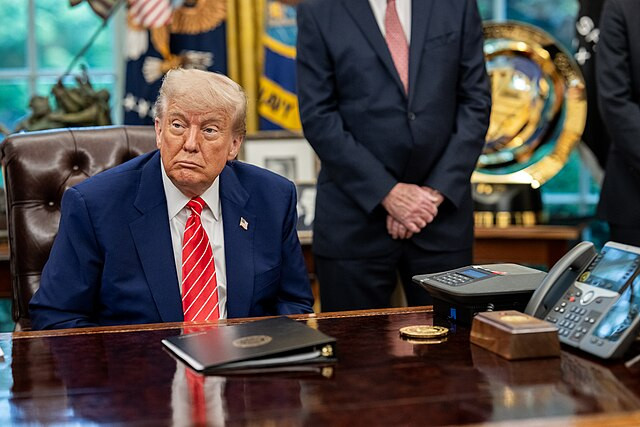President Donald Trump said Tuesday that his administration will impose steep tariffs on imported pharmaceuticals, warning that rates could rise to 250% within 18 months in a bid to force drug manufacturers to move production back to the United States.
"We'll be putting a initially small tariff on pharmaceuticals, but in one year-one and a half years, maximum-it's going to go to 150%. And then it's going to go to 250%, because we want pharmaceuticals made in our country," Trump said during a CNBC interview on Squawk Box.
The escalating tariff plan, the most aggressive yet proposed by the administration for the pharmaceutical sector, follows Trump's April directive to launch a Section 232 investigation into the national security implications of foreign drug imports. Section 232 gives the Commerce Department authority to recommend trade restrictions if imports are deemed a threat to U.S. security.
The proposal comes as drugmakers face increasing pressure under Trump's drug pricing policies, including a revived executive order from May invoking the "most favored nation" framework, which aims to align U.S. drug prices with the lower rates charged in other developed countries.
On Tuesday, Trump told CNBC that he had "invoked" the "most favored nations" policy and said it would have a "tremendous impact on the price of medicine."
The pharmaceutical industry has warned that the proposed tariffs could raise consumer prices, disrupt supply chains, and deter investment. Companies including Eli Lilly and Johnson & Johnson have recently announced new domestic manufacturing initiatives, widely seen as attempts to preempt harsher measures from Washington.
Trump last week sent letters to 17 pharmaceutical companies urging them to lower U.S. drug prices by September 29. The requests include offering all Medicaid patients access to existing drugs at the lowest global prices. Several companies said they are reviewing the letters.
Tariffs are already roiling other sectors. On Tuesday, Trump said tariffs on semiconductors and additional goods from Brazil, Canada, and the EU are moving ahead. The U.S. signed a trade agreement with South Korea that includes a 15% duty on Korean imports while exempting U.S. exports. Tariffs on semi-finished copper from multiple countries took effect August 1 at 50%.
The EU faces additional pressure as Trump warned of increased tariffs if the bloc fails to meet a pledged $600 billion investment target in the U.S. India also pushed back after Trump threatened to "substantially raise" tariffs on its exports over Russian oil purchases, accusing the U.S. of a double standard.






